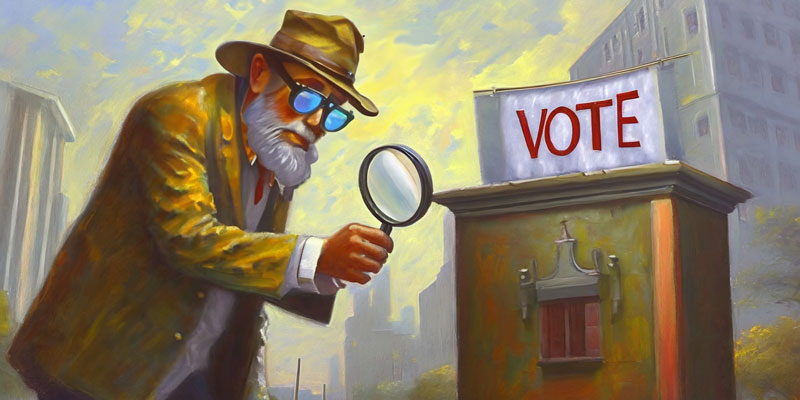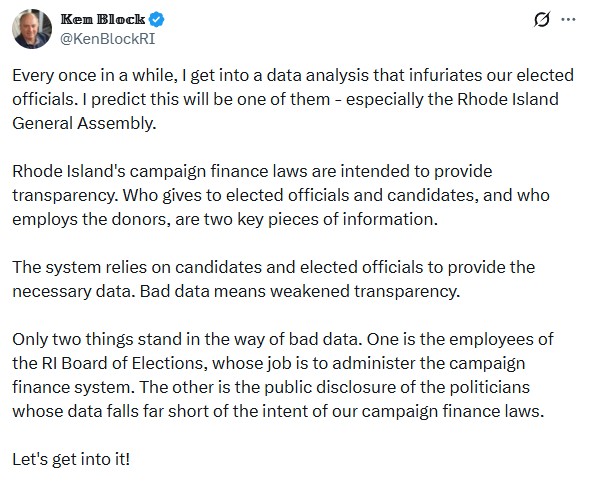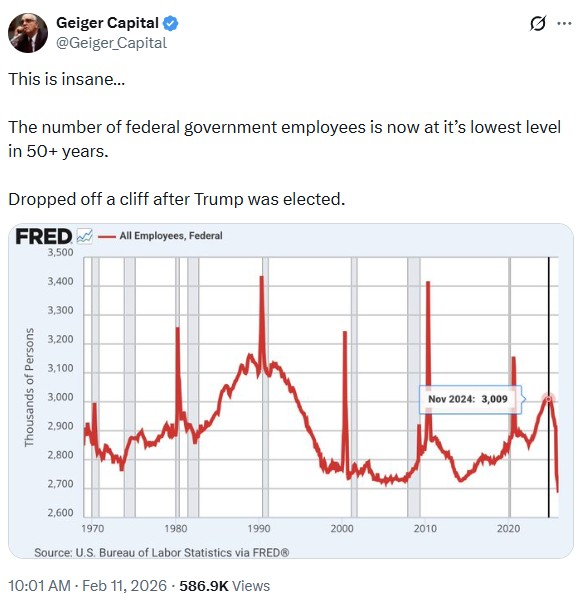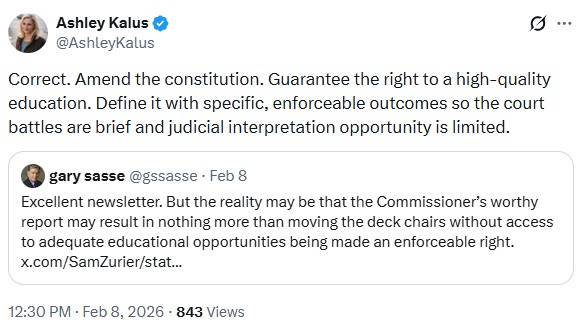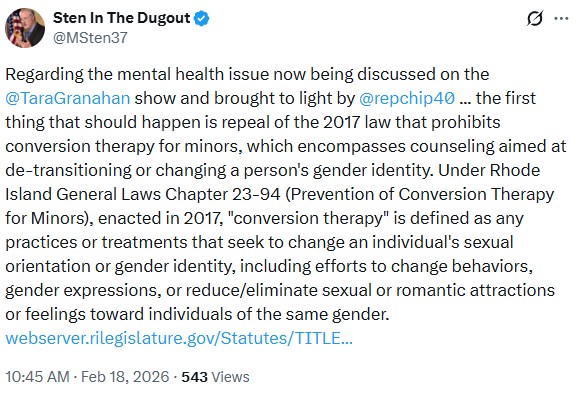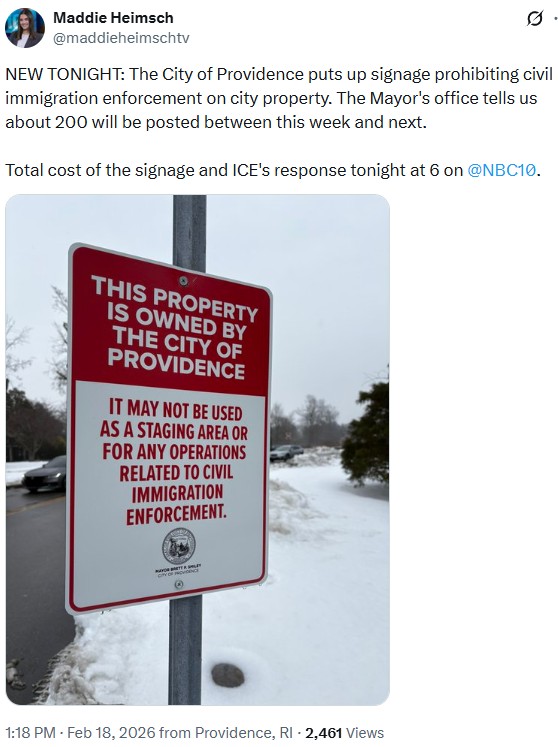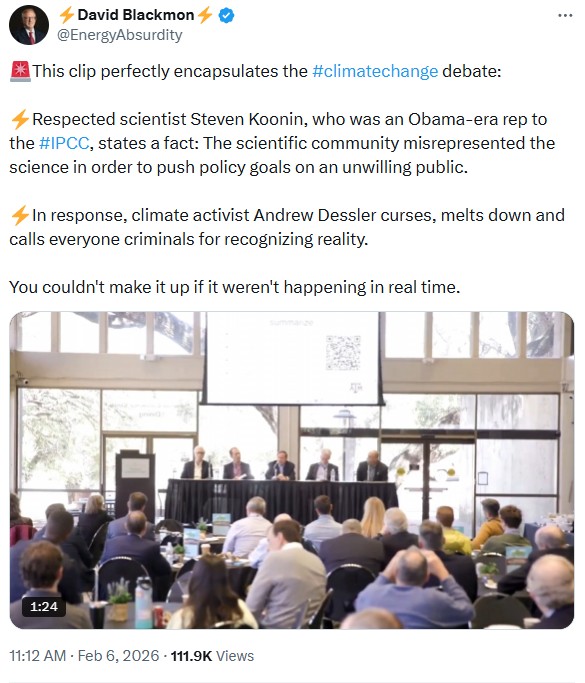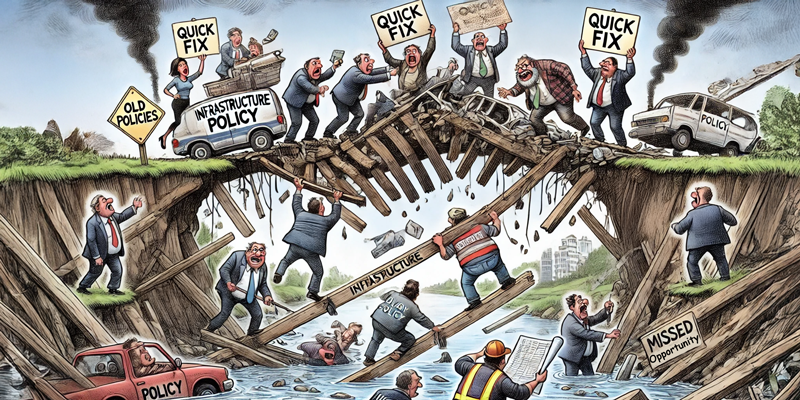John DePetro and Justin Katz discuss storm prep and political craziness.
John DePetro and Justin Katz discuss the insanity gripping Rhode Island.
Mike Stenhouse testified in front of the Commission to Study the Successful Implementation of the Act on Climate as the “loyal opposition” on February 4. Important excerpt below. RI and New England are already suffering from an energy affordability crisis – and the Act On Climate is only going to make it worse. … We’ve…
John DePetro and Justin Katz discuss the growing insanity of the American Left.
John DePetro and Justin Katz discuss the obvious realities in Minnesota and Rhode Island.
Attacks in many forms on churches should prompt us to do what our co-religionists have sometimes failed to do.
Senator Sam Zurier was a guest on “In the Dugout” with Mike Stenhouse last week. The topic of their conversation was Rhode Island’s Act on Climate and, more specifically, the charge of the Special Legislative Commission to Study the Successful Implementation of the Act of Climate, of which Senator Zurier is Chairman. Mike Stenhouse noted…
John DePetro and Justin Katz dive into the madness the modern left is escalating in RI and the U.S.
A look at different forms of voting by age group and party suggests there are, indeed, issues worth watching.
John DePetro and Justin Katz review local and national reactions to the shooting in Minneapolis and other stories.
What the RIGOP needs in a chairperson may not be obvious… or possible.
John DePetro and Justin Katz start off the year with the first Politics This Week of 2026.
John DePetro and Justin Katz discuss the aftermath of the Brown shooting investigation.
John DePetro and Justin Katz discuss politics related to the Brown University shooting.

In broad terms, I appreciate Richard Lawrence’s description of how he makes his high school English class feel like a sacred space. For example, he instructs classes to applaud visitors whenever they enter the room to demonstrate their welcome, and then:
This is a sacred space. I want them to feel that.
Before every class, we begin with a short reading from “This I Believe,” a collection of essays written by people from all walks of life, some famous and others not, who offer a glimpse into their values and personal beliefs.
“I believe in the goodness of society.” – Jackie Robinson
“I believe in empathy.” – Azar Nafisi
The daily readings take but a minute – but the hope is that they will be processed and reflected on. I embrace the thought that if the students see and hear what kindness others do, that they might also do the same.
As I first read the op-ed, however, I couldn’t help but notice that he withheld a definition of “sacred space” until near the end of the essay: “a space where students feel protected and secure.” Is that sacredness? Maybe, although it feels simultaneously broad and unnaturally constrained coming from a teacher at Mount Saint Charles Academy, with is explicitly a Catholic institution under the auspices of the Brothers of the Sacred Heart. Is that Heart sacred because it is a “protected and secure” space, or does it offer a “protected and secure” space because of whose heart it is?
Lawrence’s definition is overly broad because a space can feel “protected and secure” for reasons that have nothing to do with sanctity (a military bunker, for instance), and for that matter, different things can make different people feel both or either of those feelings. It’s unnaturally constrained, however, because it’s limited, at most, to the students’ self-esteem. That isn’t nothing, but, as a legion of Christian thinkers have pointed out over the millennia, the heart of feeling protected and secured is letting go of the self in service of He who contains all things.
If Mr. Lawrence doesn’t share that opportunity with his students, I’d say he’s depriving them of a sense of the sacred.
As our conversation in the replies suggests, Ken might have rethought this analysis because it ignores the fact candidates don’t have to report the employers of people who donate small amounts (or even their names), but it raises an important point either way:
The post is too long to quote here, so click through to read the whole thing, but the important response, to me, is that the requirement to divulge employers is disincentive to donate, and the need to keep scrupulous records is disincentive to run for office.
Ken Block and others who think like him will say people have a right to know about the candidates asking to hold elective office, and that’s fair enough, but regulating elections in this way gives powerful insiders a way to quietly inform the public we are being watched. Worse, they’re creating organizational obstacles that create the risk of fines or worse for people who run for office and lose track of the paperwork.
This is a very common and very detrimental naivete among intellectual types who follow politics and is particularly strong among those of a progressive bent. They imagine an ideal system and, implicitly, the ideal type of candidate. Then they assume that such people will exist and continue to run.
That’s foolish. Just as in business, the more the government regulates, the more good people decide it’s not worth the effort and risk to be active. The people who thrive aren’t the most honest or the best suited to the job, but those best able to work within (and manipulate) the regulations.
Here’s Rhode Island Secretary of State Gregg Amore attempting to take a principled stance against President Trump’s attempts to provide confidence in election integrity:
Amore, an East Providence Democrat, appeared on the Rhode Island Report podcast, saying, “I think it’s tremendously irresponsible for a president of the United States to speak about nationalizing elections when it’s so clearly against what the Constitution says, but also what the Founders intended.”
And then he gets foolish:
“Because it is so decentralized, it’s impossible to manipulate,” Amore said. “It’s impossible for a singular entity — the federal government — to put their finger on the scale. We should celebrate that it’s genius.”
Maybe when the Constitution was ratified — when horses were the fastest way to travel and communications had to be hand-delivered — this was close to being true, but it’s simply dishonest to suggest that partisans can’t now coordinate in key locations across the country to manipulate election results.
What bothers me, though, is something entirely ignored by Amore and his fawning fans in the local press. What does he say to Rhode Islanders (like me) with severe doubts about the integrity of our elections? “Get over it and trust us”?
I’m not asking him to proclaim us correct, if he disagrees, but it would be nice if the secretary of state would respect us enough to say (and follow up on) something like this: “It is incredibly important that all Rhode Islanders trust our election results are valid, so I’m making an extra effort to be entirely transparent, and I’m reaching out to the groups that have expressed doubts to see if anything can be done from their point of view.”
Amore will never say that, and the press will never ask him to, because the unreasonableness of us doubters is a key part of their narrative. That posture, itself, certainly doesn’t encourage confidence that Rhode Island’s Democrats have nothing to hide.
My take is different from that expressed by Geiger_Capital, here:
Actually, I think this is more like a return to sanity… not there, yet, but on the way.
Because they feel like a possible solution to our problems, calls for a constitutional right to an education are worthy of response whenever they come up. Here’s Ashley Kalus, for instance:
The idea has both theoretical and practical problems. Theoretically, you can’t guarantee a high-quality education. Education depends on the student; it depends on the teacher; and it depends on the system’s subjective assessment of what is required. By the nature of education, the law, let alone the state constitution, can’t articulate what “high quality” would mean for every student across time.
The only criterion that can possibly remain, therefore, is the spending. Even then, the policy is a request for trouble. What would such an amendment require for a student who has low aptitude and is in an unhelpful family situation in a system that can’t supply teachers with the qualification to help him? Import an international team of specialists to tutor this one child to an agreed level of “quality”?
That may sound so absurd that we could safely assume nobody in any position of responsibility would insist on such an interpretation. I wouldn’t be so sure, but even so, the extreme is illustrative. The most likely outcome, given the reality of who has power in Rhode Island, is that the amendment would require ever more spending than taxpayers can bear in order to cast about for solutions that aren’t practical.
And at the heart of the practical problems with the policy is that the holders of power in our state will never let a policy pass that isn’t in their interest. Under no circumstances will they allow a policy in which “a right to a high-quality education” means a judge or some other authority could loosen the stranglehold the teacher union has on our education system. If we were able to enact such a policy, it would only prove that we’d broken the stranglehold already and don’t need to risk meddling with the constitution.
Did you ever notice something about the images accompanying performative declarations about “banned books week” and related activism?
All of those books are incredibly well known. In fact, I think one could reasonably say that many people, especially conservatives, would be overjoyed to learn that such books were being returned to classroom reading lists (at the appropriate level, of course). Something is wrong with a list of “most banned books” when they’re 10 of the best-known novels of the last two centuries.
Let’s acknowledge the possibility that this particular picture is a clickbait fabrication. Similar lists include many of these books with a few others added. The point remains: The books that are truly the “most banned” (at least if being “banned” means anything negative) would necessarily be unfamiliar.
As with most teapot tempests of late, which tend to come from tinpot social tyrants, advocates shy from genuine evaluation because the books that would make such a list would have two effects on the people investigating:
- They would challenge the progressive beliefs of the list makers, who tend to be the ones currently gaslighting about “banned books.”
- Or they would put the spotlight on the fact that there are, indeed, books the average person would see some reason for banning, and those would be socially radical and society-destroying works mostly from the progressive left.
Mike Stenhouse is exactly right, here:
This legislation passed during a period when I was reading all or most legislation proposed in the General Assembly, and it struck me as a terrible sign of things to come. The very same people who were crying terror over insurers “coming between people and their doctors” were doing everything they could to forbid doctors from helping patients to achieve their own goals if those goals raised questions about the politicians’ ideology.
It’s really a lesson in how people construct narratives for their future decision making and the danger of funneling power to an institution in which human decisions directly control our society. Somewhere along the way legislators picked up the narrative that declarations of alternative sexual identities could only be genuine, and that the direction of inappropriate and abusive treatment could only be the “traditional beliefs” imposed on them to stop those declarations.
Those legislators then became unable even to imagine situations in which the most caring and appropriate treatment would be to discourage a patient from convincing himself or herself that she had X identity and living according to the popular understanding of what that means for behavior.
Fortunately, we’ve inherited an intellectual tradition that includes logic and dispassionate analysis, and applying those tools to this issue shows the conversion therapy ban to be dangerous nonsense.
If the words on these signs are meant to be taken seriously, it seems to me they must be unconstitutional:
The associated article puts the cost of the signs at $3,764, although that isn’t likely to include the pay for the city employees going around installing signage in frigid weather and deep snow.
The cost to our respect for the Constitution is another matter. You can tell how unserious elected officials and journalists are by the fact that the term, “staging,” isn’t defined or requested to be defined. Does this mean ICE officers can’t walk across the property, talk to each other on it, park on it, eat their lunches on it… what?
Governments can’t arbitrarily discriminate between otherwise lawful uses of public property. If anybody can use public property for “staging” or for anything that is similar to it, then the city can’t discriminate against one group or one lawful activity.
That’s the key point, of course. The Democrats of Rhode Island want to pretend immigration law enforcement is illegal or immoral, but they can’t make that declaration directly, so they engage in performative acts like spending taxpayer dollars on ugly signs and setting up a conflict when ICE agents justifiably ignore them.
This post on X by Houseofyogi is too long to screenshot, but it explains the lunacy of the unrealized gains tax concept. This is the first of several examples:
Unrealized gains tax for Gen-Z:
You buy a Pokémon card for $50.
Someone offers you $500 for it. You say no. You love that card. You’re keeping it.
The government says: “Cool, but that card is worth $500 now. You owe us $100 in taxes.”
You: “…I didn’t sell it.”
Government: “Don’t care. Pay up.”
You don’t have $100 lying around. So you’re forced to sell the card you love just to pay a tax on money you never received.
Next month? That card drops back to $50. Your card is gone. Your money is gone. And the government shrugs.
A savvy reader might wonder if the government didn’t just accidentally force this person to make money without loss, assuming it’s possible to buy the card back at the lower rate. But that’s beside the point as the subsequent examples show.
A tax on unrealized gains is simply insane. It’s one of those ideas that exposes the utter ignorance (or malice) of the person making it. The possibility that people could get it passed is a very strong point for rigid checks and balances in representative democracy.
This point seems important to recognize in Rhode Island, where local journalists mainstream people who openly call for the end of all prisons. Here’s Arthur MacWaters:
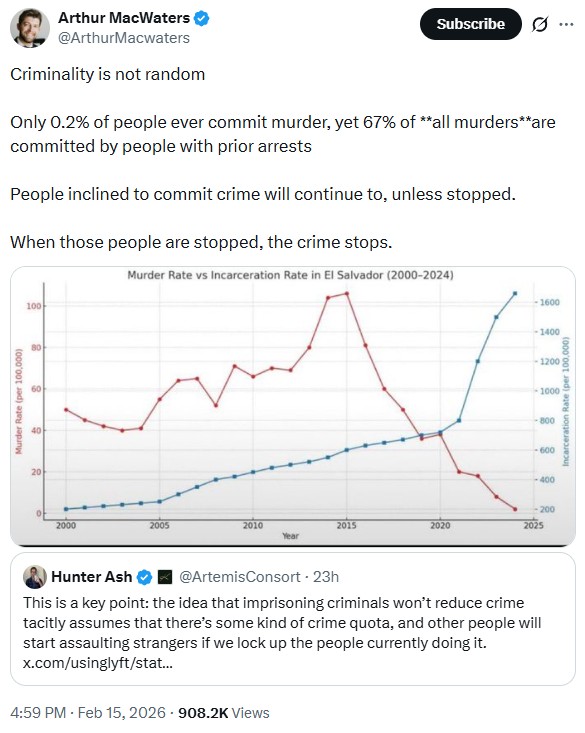 Of course, even Macwaters’s chart doesn’t tell a clear story, but we can say that under some circumstances locking up criminals can just about eliminate some crimes. The fact that there are well-funded organizations pushing for something crazy like elimination of all prisons ought to make us (especially journalists) wonder what more there is to the story.
Of course, even Macwaters’s chart doesn’t tell a clear story, but we can say that under some circumstances locking up criminals can just about eliminate some crimes. The fact that there are well-funded organizations pushing for something crazy like elimination of all prisons ought to make us (especially journalists) wonder what more there is to the story.
To be fair, Frédéric Dimanche’s piece in the Providence Business News is appropriately placed in the commentary section, but it’s not like he’s a local professor who wanted to publish in the local business press. He’s a Canadian professor syndicated by mainstream sources. In other words, the PBN editors deliberately selected this piece for publication.
That being the case, I have to wonder why.
Personally, I find the op-ed instructive, because it exposes so many of the standard postures of foreign intellectuals that our domestic mainstream finds so alluring. Primarily, that posture insists the United States is at its best when weak and foreigners’ hypocrisy is ignored.
Ostensibly, Dimanche is warning Americans that policies of the Trump administration are making tourists, especially skittish Canadians, reluctant to vacation here. This, he says, is already costing billions of dollars in visitor spending and may put a damper on any boost the country would experience for hosting the soccer World Cup. In isolation, I agree it would be preferable to avoid these outcomes, but nothing happens in isolation. Everything is a tradeoff.
So what is Dimanche suggesting the United States should trade for the good will of Canadian tourists?
- Open borders
- Trade deficits
- A less-valuable dollar
Dimanche complains that the Trump administration has made noises about reviewing visitors’ social media profiles, but he doesn’t explore the reason or, for that matter, how the proposed policy would differ from the Orwellian changes in other countries, like Great Britain. He also doesn’t investigate the tourists’ side of the equation. Maybe Canadian tourism is falling so dramatically because that country’s own policies are impoverishing its people.
It’d be interesting to know how Canada-U.S. tourism compares with Canada-anywhere tourism, as well as tourism to and within Canada. You’d think these would be a key datapoint for an academic studying tourism to disclose in a syndicated column meddling in the politics of another country.
I agree almost entirely with Patricia, here:
My one adjustment would be to specify that our local media isn’t biased only against Republicans. They’re biased against Rhode Islanders. Journalists’ first concern, whether out of self-interest or ideological sympathy, is the Democrat Party.
With this expanded view, we can see a broader pattern. The Party does things that repeatedly and manifestly hurt Rhode Island families and never pays a consequence in large part because the media runs interference to obscure the Party’s role and to maintain a fear of alternatives.
With Morgan’s topic, the Trump administration is doing something that helps Rhode Islanders, and the media is ignoring it. On a much wider scale, wherever Rhode Islanders’ interests diverge from the Party’s, the media sides with the Party.
It’s like the teacher unions. When the students’ interests happen to coincide with the teachers (especially with budgets), the union backs the students. When those interests diverge, the students can be an obstacle.
In a very superficial way, this sort of rhetoric from Democrat Senator Bernie Sanders (VT) may be appealing:
We shouldn’t be naive about AI and automation — they’re going to disrupt our economy hugely — but when Sanders goes on to detail the menial and entry-level jobs that will be hit first, he exposes a problematic starting point. Adjustment difficulties notwithstanding, reducing the need for human beings to do menial work is progress.
We should still find ways for people to have that experience and resist the urge to live and work always with clean hands, so to speak. We must also rethink our application of policy to economics to better understand and respond to the changes. But the focus on a count of jobs misses the point.
When I was young, we were all terrified of nuclear war and the dangers of nuclear technology — so much so that we almost completely wrote off its potential benefits, especially for energy. AI has a similarly existential risk, but it also has incredible benefits. We shouldn’t make the same mistake we made back then, when the regressive Bernie Sanderses of the world won the day.
One gets the sense that what they most fear is autonomy, and until they can figure out how to harness the incredible power of technology to ensure their own power (as in China), they want everybody to stop in place. If that makes us suffer, so much the better, because then we’ll be vulnerable to their revolutionary propaganda.
Because it is simply so masterful, I wanted to share Haviv Rettig Gur responding to an antagonistic heckler explaining the Israeli point of view.
For all those who asked, here is a clip of @havivrettiggur responding to masked protesters interrupting his lecture at Haverford College on February 1, 2026. Enjoy and learn. https://t.co/CArmYt6ATU pic.twitter.com/Bw6jEl1YxQ
— Rachel Gur (@RachelGur) February 9, 2026
It’s a perfect mix of respect and dismissiveness, humor and seriousness, as well as confident authority. As a process guy and a practitioner, when I see such performances, I wonder how much of it is prepared and practiced and how much is simply improvisational talent. Probably it’s a mix mainly involving comfort with the subject matter and some regularly used phrases or runs, like a jazz musician who plays in runs, not necessarily choosing every note as he goes.
As a prior caveat, I should be clear that I’m not familiar with all the players and their motivations, but when I see a video like this — in which an identified scientist states plainly that facts about the climate were misrepresented — I can’t help but wonder how many people even know this is a debate:
Keeping people from knowing there’s even a debate is central to most progressive initiatives, because the public would not approve of most of what they want to do if there were any doubt or any alternatives.
If you’ve only come across RI Department of Transportation Director Peter Alviti’s resignation letter through the news and social media, it might be easy to miss the fact that this wasn’t some letter he sent to the governor and a few reporters. It’s posted on RIDOT’s website under News & Press Releases.
That’s important because the letter is unseemly in a thuggish way:
To be clear, I was not fired, nor was I asked to resign. This decision has nothing to do with the Washington Bridge. As I’ve stated before, that project is on autopilot—I’ve put everything in place, and the contractor I selected will continue to build it as they have successfully done for the past 100 years. My retirement from DOT is a decision made solely by my wife and me. Rest assured, I will be paying close attention between now and August to everything that is said publicly about this. If anyone lies or misrepresents the facts for personal gain, they will hear from me—forcefully.
Put aside the very important question of whether Rhode Islanders want this major project to be “on autopilot.” (I do not.) What’s striking is the overt threat from a public official on government letterhead posted through official channels, not a personal blog.
When I first heard of the document, I assumed it was a letter from Alviti to Governor McKee, about which the governor could do very little. This is an official document, and the governor has authority over that.
He’s a union puppet, so he won’t do anything, but McKee should take whatever steps are available to him to censure his RIDOT director. He should also instruct that this ridiculous missive be taken down and replaced with a statement that more appropriately reflects the tone and respectability of the state government.
Of course, it’s possible that under Daniel “Hang Up on Them” McKee, this is genuinely reflective of the tone and respectability of state government.
Either through subsidy or regulatory pressure, government encourages purchases that align with some fashionable social policy. Businesses spring up to take advantage of the sudden market where there was not one before, and then the businesses go bankrupt. Maine State Representative Laurel Libby, a Republican, highlights the expanding costs in the case of Maine’s electric school buses:
Maine taxpayers are now footing the bill for “mitigation strategies” and “disposal plans” for buses that were SUPPOSED to save money and “help the environment.” The state even hired a Vermont consulting firm to provide “one-on-one support” to districts… MORE taxpayer dollars spent cleaning up a mess created by the Biden administration!
This isn’t just about buses. It’s deja vu. Politicians roll out expensive, ideological experiments without thinking through the consequences. When they fail, Mainers are left holding the bag. (Think, solar subsidies!)
A worthwhile exercise for Republican staffers and (oh, I don know) journalists in Maine would be to investigate what connections there might have been between local, state, and federal politicians and the companies that wound up benefitting. One reason we keep seeing such things happen is that nobody in office ever pays a price.
By “a price,” I don’t mean some small increase in the difficulty of getting reelected. I mean a tangible financial or reputational price for setting taxpayers up for failure.
The battle of Rhode Islanders who own waterfront property and agents of the state who want to assert authority over that property continues:
The 2023 Rhode Island shoreline access law is facing a challenge by some shoreline property owners in South Kingstown and Westerly. They argue it is an unconstitutional taking of private property.
In July 2024, a judge sided with the property owners, ruling the law unconstitutional and requiring the state to compensate them. This ruling is being appealed, and the law remains in effect pending the outcome of that appeal.
In response, the Coastal Resources Management Council (CRMC) is attempting to require property owners to give up these rights in exchange for permits to maintain their land, essentially writing the unconstitutional clause into contractual agreements with the individual Rhode Islanders.
The property owners are right: This is property confiscation by another name. That doesn’t mean the state couldn’t or shouldn’t attempt to secure the easements it seeks, but it suggests a different approach.
The issue brings to mind a clip that’s been going around social media of a Mamdani supporter saying the city should forbid businesses from leaving or should be seized if they try. In this view, the business is providing a public good, so progressives have the right to take it away.
Either the individual is self-sovereign, with inalienable rights, or enough other people can get together and call themselves a “government” to violate those rights. It’s an old dispute.
I’m not sure I believe him, here:
Senate Majority Leader Frank Ciccone III says he will soon file legislation to protect Rhode Islanders from the examples of unconstitutional conduct by federal immigration officers making headlines in other states.
“Look at what’s taking place across the country, we don’t want that to happen here,” Ciccone said in an interview Friday. “We don’t want somebody just picking someone up without a warrant.”
As illustrated by the fact that Ciccone’s legislative superior, Senate President Valarie Lawson, is also the president of one of the state’s two teacher unions, which is perhaps the most radical and powerful activist group in the state, I’m inclined to suspect Rhode Island’s Democrats would love to bring the chaos and unrest we’re seeing in other Democrat-run states to Rhode Island.
Left-wing riots would give them additional political leverage, give them opportunities to force state and federal taxpayers to fund union employees for the clean-up and repair, and give them excuses to crack down on the speech and rights of their opposition.
At absolute best, Ciccone is merely pandering. Look how quickly he filed his legislation, even admitting in the article he’s ignorant of the facts of the Alex Pretti shooting. Moreover, the legislation is useless. A state statute “requiring [ICE] agents to conduct their duties in full compliance with the United States Constitution” is redundant on its face.
Whatever Ciccone’s level of cynicism, Rhode Islanders must see through these performances as the scams they are. If state officials really wanted to ensure ICE conducted itself properly and all citizens’ Constitutional rights were protected, they’d be working with the agency, not resuming the poses of the southern Democrats who started a Civil War.
I’ve continued to see Democrats and mainstream journalists point to the Jeffrey Epstein scandal as if everybody simply knows it’s a huge liability for President Donald Trump. Because I don’t require purity in politics, only the most practical and lesser of the available evils, I’m not greatly invested either way, but there’s reason to (further) discount the credibility of anybody who’s still expecting Epstein to bit Trump:
Naturally, those who’ve been using the name, Epstein, as a running barb against the President will simply flip back to ignoring the story once it’s clear it’s only going to undermine their entire social class. Once again, even if it comes back to include Donald Trump, the aristocrat who’s bringing down the corrupt aristocracy is preferable to those who would continue to bolster it and cover up its crimes.
For that reason, I think perhaps I’ve paid too little attention to the story. Here’s a clip of Bill Maher quoting self-help gurus who buddied up to Epstein and enjoyed dipping into his perverse lifestyle. These are the people who presume to tell us how to live and for whom to vote. Indeed, I agree with the first reply, from Klay Thompson, to the post with the video:
I don’t think they appreciate the amount of resentment that this builds within a society, when it knows its elites have committed such crimes and it is going completely unchecked.
As with all the political scandals of the last 20 years, somebody has to pay a consequence. For me, it’s no longer enough to stop the bad behavior. It has to be rooted out. We have to recover our capacity to be disgusted by it.
Why is “the argument that the state should… simply spend less… unrealistic?” The editorial goes on to emphasize that it’s a “gubernatorial election year,” implying that lower spending is politically “unrealistic,” but the editors’ point isn’t clear.
The headline is “Can we grow jobs with a wealth tax?” The state’s leading publication focused on business should be willing to make that a sentence: “We can’t grow jobs with a wealth tax.”
I realize everybody with a position to defend in this state wants to stay on the good side of progressives and to remain sympathetic to the political challenges of less-progressive Democrats, but at some point, you’ve got to take a stand.
The hockey shooter was not complicated, and neither is the tragedy’s lesson.
If I’m understanding the consensus of the Rhode Island media, the causes of the father’s murderous public attack on his family at a Pawtucket ice rink are so perplexingly complex they can’t be understood — tangling ideological lines, as they do — although provocative images he tattooed on his skin were probably more of a…
RI’s mainstream politicians and journalists risk causing more tragedies.
It took me a little while to understand why Rhode Island’s Democrat Speaker of the House Joseph Shekarchi would rush out with a statement like this, displaying two ideological tells,…
OK. RIDOT cheated. So where’s the accountability?
WPRI’s Ted Nesi appears to have caught the state Department of Transportation cooking the books on bridge deficiency at the last minute, just in time for Director Peter Alviti’s thuggish…
Remember that old cliché about “if women ruled the world”?
Slogans and questionable heuristics have probably always been a factor in civic life, especially when ordinary people gained influence in politics, as with the vote. In the last seventy years,…
What school districts never say shows their bad incentives.
Cranston School Superintendent Jeannine Nota-Masse is looking to add $6 million to her budget, bringing her total within a one-year increase of $200 million, or $195,777,310, to be precise. According…
RI’s mainstream politicians and journalists risk causing more tragedies.
It took me a little while to understand why Rhode Island’s Democrat Speaker of the House Joseph Shekarchi would rush out with a statement like this, displaying two ideological tells, so quickly after the shooting at the Pawtucket ice rink: Some statement is understandable, even obligatory, and the ideological tick and peculiar grammar of “caused…
OK. RIDOT cheated. So where’s the accountability?
WPRI’s Ted Nesi appears to have caught the state Department of Transportation cooking the books on bridge deficiency at the last minute, just in time for Director Peter Alviti’s thuggish resignation letter. According to Nesi: Target 12 discovered, however, that between the two reports the agency changed how it calculates its progress. While the September…
Remember that old cliché about “if women ruled the world”?
Slogans and questionable heuristics have probably always been a factor in civic life, especially when ordinary people gained influence in politics, as with the vote. In the last seventy years, however, sloganeering has gotten out of control because people stopped seeing slogans as rallying cries with some underlying truth and started seeing them as plain…
What school districts never say shows their bad incentives.
Cranston School Superintendent Jeannine Nota-Masse is looking to add $6 million to her budget, bringing her total within a one-year increase of $200 million, or $195,777,310, to be precise. According to Anchor Rising’s October Enrollment module, Cranston had 9,906 students registered in October. That’s down about 12% from its high in the 2002, which isn’t…
Who’s watching over us and why when it comes to “affordable housing”?
Writing for the Sakonnet Times, Christian Silvia details some of the large housing developments in the works for Tiverton and reports on this reasonable-seeming request from the town: With hundreds of new housing units potentially coming to Tiverton, members of the Tiverton Town Council may ask the General Assembly to allow Tiverton to count the number…
Politicians’ asserting that they want to help doesn’t mean they do or will.
At first, I hesitated to post about this video clip, shared by John DePetro, on a Sunday: Politicians like Democrat Lieutenant Governor Sabina Matos make it difficult not to sound uncharitable when responding, not least because they wrap themselves in good intentions. So, here she is talking about lowering food prices to help Rhode Island…

In broad terms, I appreciate Richard Lawrence’s description of how he makes his high school English class feel like a sacred space. For example, he instructs classes to applaud visitors whenever they enter the room to demonstrate their welcome, and then:
This is a sacred space. I want them to feel that.
Before every class, we begin with a short reading from “This I Believe,” a collection of essays written by people from all walks of life, some famous and others not, who offer a glimpse into their values and personal beliefs.
“I believe in the goodness of society.” – Jackie Robinson
“I believe in empathy.” – Azar Nafisi
The daily readings take but a minute – but the hope is that they will be processed and reflected on. I embrace the thought that if the students see and hear what kindness others do, that they might also do the same.
As I first read the op-ed, however, I couldn’t help but notice that he withheld a definition of “sacred space” until near the end of the essay: “a space where students feel protected and secure.” Is that sacredness? Maybe, although it feels simultaneously broad and unnaturally constrained coming from a teacher at Mount Saint Charles Academy, with is explicitly a Catholic institution under the auspices of the Brothers of the Sacred Heart. Is that Heart sacred because it is a “protected and secure” space, or does it offer a “protected and secure” space because of whose heart it is?
Lawrence’s definition is overly broad because a space can feel “protected and secure” for reasons that have nothing to do with sanctity (a military bunker, for instance), and for that matter, different things can make different people feel both or either of those feelings. It’s unnaturally constrained, however, because it’s limited, at most, to the students’ self-esteem. That isn’t nothing, but, as a legion of Christian thinkers have pointed out over the millennia, the heart of feeling protected and secured is letting go of the self in service of He who contains all things.
If Mr. Lawrence doesn’t share that opportunity with his students, I’d say he’s depriving them of a sense of the sacred.
As our conversation in the replies suggests, Ken might have rethought this analysis because it ignores the fact candidates don’t have to report the employers of people who donate small amounts (or even their names), but it raises an important point either way:
The post is too long to quote here, so click through to read the whole thing, but the important response, to me, is that the requirement to divulge employers is disincentive to donate, and the need to keep scrupulous records is disincentive to run for office.
Ken Block and others who think like him will say people have a right to know about the candidates asking to hold elective office, and that’s fair enough, but regulating elections in this way gives powerful insiders a way to quietly inform the public we are being watched. Worse, they’re creating organizational obstacles that create the risk of fines or worse for people who run for office and lose track of the paperwork.
This is a very common and very detrimental naivete among intellectual types who follow politics and is particularly strong among those of a progressive bent. They imagine an ideal system and, implicitly, the ideal type of candidate. Then they assume that such people will exist and continue to run.
That’s foolish. Just as in business, the more the government regulates, the more good people decide it’s not worth the effort and risk to be active. The people who thrive aren’t the most honest or the best suited to the job, but those best able to work within (and manipulate) the regulations.
Here’s Rhode Island Secretary of State Gregg Amore attempting to take a principled stance against President Trump’s attempts to provide confidence in election integrity:
Amore, an East Providence Democrat, appeared on the Rhode Island Report podcast, saying, “I think it’s tremendously irresponsible for a president of the United States to speak about nationalizing elections when it’s so clearly against what the Constitution says, but also what the Founders intended.”
And then he gets foolish:
“Because it is so decentralized, it’s impossible to manipulate,” Amore said. “It’s impossible for a singular entity — the federal government — to put their finger on the scale. We should celebrate that it’s genius.”
Maybe when the Constitution was ratified — when horses were the fastest way to travel and communications had to be hand-delivered — this was close to being true, but it’s simply dishonest to suggest that partisans can’t now coordinate in key locations across the country to manipulate election results.
What bothers me, though, is something entirely ignored by Amore and his fawning fans in the local press. What does he say to Rhode Islanders (like me) with severe doubts about the integrity of our elections? “Get over it and trust us”?
I’m not asking him to proclaim us correct, if he disagrees, but it would be nice if the secretary of state would respect us enough to say (and follow up on) something like this: “It is incredibly important that all Rhode Islanders trust our election results are valid, so I’m making an extra effort to be entirely transparent, and I’m reaching out to the groups that have expressed doubts to see if anything can be done from their point of view.”
Amore will never say that, and the press will never ask him to, because the unreasonableness of us doubters is a key part of their narrative. That posture, itself, certainly doesn’t encourage confidence that Rhode Island’s Democrats have nothing to hide.
My take is different from that expressed by Geiger_Capital, here:
Actually, I think this is more like a return to sanity… not there, yet, but on the way.
Because they feel like a possible solution to our problems, calls for a constitutional right to an education are worthy of response whenever they come up. Here’s Ashley Kalus, for instance:
The idea has both theoretical and practical problems. Theoretically, you can’t guarantee a high-quality education. Education depends on the student; it depends on the teacher; and it depends on the system’s subjective assessment of what is required. By the nature of education, the law, let alone the state constitution, can’t articulate what “high quality” would mean for every student across time.
The only criterion that can possibly remain, therefore, is the spending. Even then, the policy is a request for trouble. What would such an amendment require for a student who has low aptitude and is in an unhelpful family situation in a system that can’t supply teachers with the qualification to help him? Import an international team of specialists to tutor this one child to an agreed level of “quality”?
That may sound so absurd that we could safely assume nobody in any position of responsibility would insist on such an interpretation. I wouldn’t be so sure, but even so, the extreme is illustrative. The most likely outcome, given the reality of who has power in Rhode Island, is that the amendment would require ever more spending than taxpayers can bear in order to cast about for solutions that aren’t practical.
And at the heart of the practical problems with the policy is that the holders of power in our state will never let a policy pass that isn’t in their interest. Under no circumstances will they allow a policy in which “a right to a high-quality education” means a judge or some other authority could loosen the stranglehold the teacher union has on our education system. If we were able to enact such a policy, it would only prove that we’d broken the stranglehold already and don’t need to risk meddling with the constitution.









